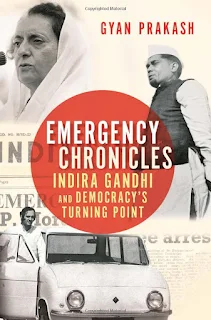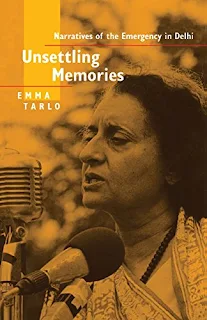The Emergency provisions are contained in part XVIII of the
constitution, from article 352 to 360. These provisions enable the central
government to meet any abnormal situation effectively.
The rationality behind
the incorporation of theses provisions in the constitution is to safeguard the
sovereignty, unity, integrity and security of the country, the democratic
political system, and the constitution.
What does actually happen in Emergency?
During
Emergency, the central government becomes all powerful and the states go into
the total control of the Center.
It converts the federal structure into a
unitary one without a formal amendment of the constitution. This kind of
transformation of the political system from federal during normal times to
unitary Emergency is a unique feature of the Indian constitution.
How many types of emergencies?
The constitution
stipulates three types of emergencies:
1. An emergency due to war, external aggression or armed rebellion (Article
352). This is popularly known as ‘National Emergency’. However, the
constitution employs the expression ‘proclamation of emergency’ to denote an
emergency of this type.
2. An emergency due to failure of the constitutional machinery in the states
(Article
356). This is popularly known as ‘president rule’. It is also
known as by two other names ----- ‘state Emergency’ or ‘constitutional
Emergency’. However, the constitution does not us the word ‘emergency’ for this
situation.
3. Financial Emergency due to threat to the financial stability or credit
of India. (Article 360)
Lets know in detail----
1. National Emergency
Article 352 holds the
key for national Emergency, provisions which are taken from Germany or Weimar
constitution.
National emergency
can be declared by the president in India. If he is satisfied that the
situation is very serious and the security of India or any part thereof is
threatened or is likely to be threatened.
The president
can declare national emergency only if the cabinet recommends in writing. Such proclamation of emergency must be approved by both houses of parliament by
absolute majority of the total membership of the houses as well as 2/3 majority
of members present and voting within one month, otherwise the proclamation ceases (finishes) to operate.
In case at
the time of proclamation of emergency the Lok Sabha stands dissolved or not in
session, it must be approved by the Rajya Sabha within one month and later by
the Lok Sabha also within one month of the start of its next session.
Time- Once proclamation
of emergency approved by the parliament, the emergency remains in force for a
period of six month from the date of proclamation. In case if the emergency extends beyond six months, another prior resolution must be passed by the parliament. In this way such emergency continues indefinitely. But if the situation improves
the emergency can be revoked by another proclamation by the president of India.
The 44th
amendment of the constitution provide that 10% or more members of the Lok Sabha
can demand a meeting of the Lok Sabha and in that meeting, it can disapprove or
revoke the emergency by a simple majority. In such cases emergency will immediately
become inoperative.
Effects of National Emergency
n The first and foremost effect of an
emergency is the suspension of the fundamental rights guaranteed by Article 19
of the Indian constitution. Under the article 358 and 359, the president of India
can extend the suspension of all fundamental rights except those mentioned in Article
20 and 21.
n Union Executive is free to give directions
on all the subjects and such directions are binding on the states. State government
is not dismissed when National Emergency is proclaimed but brought under the
effective control of the union. Under article 250 when national emergency is in
force, parliament assumes concurrent legislative jurisdiction over all the
subjects under the state list. State legislative assembly is not suspended or
dissolved. It continues to enjoy the jurisdiction over state subjects, but
parliament also assumes legislative powers on such subject.
n The satisfaction of president under
article 352 can be challenged in a court of law on the ground of mala fide.
2. The State
Emergency (President Rule)
Article 355 imposes a duty on the center to
ensure that the government of every state is carried in
accordance with the provisions of the constitution. The Center government takes over the government of a state
under Article 356 in case of failure of constitutional machinery in state. This
is popularly known as ‘president rule’. It is also known as ‘State Emergency’.
Article 356 empowers the president to issue a proclamation, if he is satisfied that a situation has arisen in which the government of a state cannot be carried on in accordance with the provision of the constitution. Notably, the president can act either on a report of the governor of the state or otherwise too (i.e., even without the governor’s report).
Article 365 says that whenever a state fails
to comply with or to give effect to any direction from the center, it will be
lawful for the president to hold that a situation has arisen in
which the government of the state cannot be carried on in accordance with provision
of the constitution.
Scope of Judicial Review: -The 38th Amendment Act of 1975 made the
satisfaction of the president in invoking Article 356 final and conclusive which
could not be challenged in any court on any ground. But this provision was
subsequently deleted by the 44th Amendment Act of 1978 implying that
the satisfaction of the president is not beyond judicial review.
3. Financial Emergency
Article 360 empowers the president to proclaim a Financial
Emergency. If he is satisfied that a situation has arisen due to which the financial
stability or credit of India or any part of its territory in threatened.
Effect of
Financial Emergency
The consequences of the proclamation of a Financial
Emergency are as follows.
n
The executive authority of the Centre extends (a)
to directing any state to observe such canons of financial propriety as are specified
by it and (b) directions as the president may b deem necessary and adequate for
the purpose.
n
Any such direction may include a provision
requiring (a) the reduction of salaries and allowance of all or any class of
persons serving in the state; and (b) the reservation of all money bill or
other financial bills for the consideration of the president after they are
passed by the legislature of the state.
n
The president may issue directions for the
reduction of salaries and allowance of (a) all or any class of persons serving
the Union; and (b) the judges of the Supreme Court and the high court.












